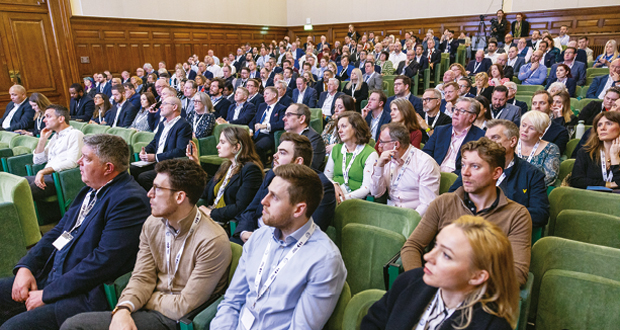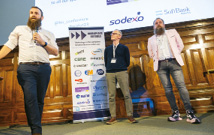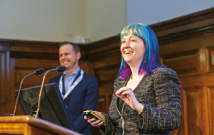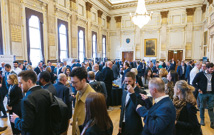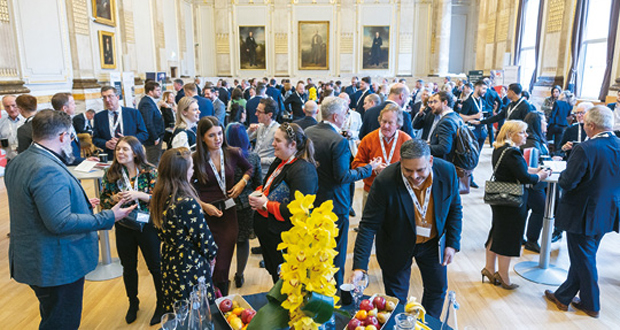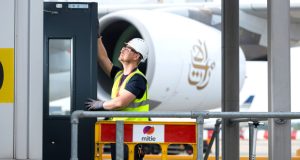The 2023 Workplace Futures Conference explored ways technology might change facilities management for the better. But the human experience remains a priority
The theme for this year’s Workplace Futures Conference was Technology in the workplace: beyond the information age. Although this resulted in some sessions that delved in a bit too much detail into the tech, the programme, which was ably moderated by Chair Martin Pickard was interspersed with presentations that reminded us to keep in mind the human element.
Long-time FM innovator Lionel Prodgers MD of Agents4RM introduced the day’s theme with an exploration of the history of FM technology and how managing information became a key part of FM operations. Unfortunately, as Nigel Warrick of Cadline, pointed out in his session, according to research, over 95 per cent of all data captured goes unused in the engineering and construction industries.
Graham Perry from Datore suggested that if data analytics is difficult to manage in house, the solution for FMs is to outsource it. He also predicted that with the development of AI, in the future the FM industry will be able to create models that automate many processes.
WORKPLACE EXPERIENCE
Moving away from the tech, the next set of speakers focused on the workplace experience. Planon’s Peter Ankerstjerne explored the evolution of the experience-based office, a place that is there for reasons that are more than being productive. He explained the value proposition FMs provide has to be better than before as the workplace is not just about productivity. It’s about collaboration, learning, socialising and culture and that is why FMs have a unique opportunity to drive change within the office from being attendance based to outcome based.
Mitie’s Simi Gandhi-Whitaker stressed the importance of asking the right questions of clients who otherwise feel overwhelmed by the tech and can’t see its value. As you talk through their main ‘pain points’ the need for solutions, for instance remote asset monitoring for hard to access sites, becomes apparent. It’s all about human intelligence, not artificial intelligence, she concluded.
Simone Fenton-Jarvis summed up the current hybrid workplace conundrum which is that we’re essentially using traditional working methods in a digital world. There is space in the employee experience for the office, she said, and even if there is some confusion around hybrid working we can still provide a place where people thrive.
MORE FOR LESS
Theories on delivering better value seemed somewhat academic given the news that the facilities sector is in danger of ‘falling off a cliff’. Citing research into the workplace experience by the Leesman Index, CEO Tim Oldman revealed 41 per cent of employers intend to use the office just one day a week and 69 per cent of organisations are looking to reduce their real estate footprints. “There are a whole lot of execs asking ‘why do we need a workplace anyway?’” he warned. “This is why it’s imperative that FMs evaluate what it is that the workplace does, access the value it offers and work on delivering twice the experience in half the space.”
A powerful way of improving the employee experience is through the deployment of apps. Peter Reigo, of Flowscape, along with Claire Callan from client WSP, were on hand to explain that with hybrid working presenting such a major challenge, the latest tech can help deliver a frictionless employee experience; locating colleagues, booking a meeting room, or wayfinding in an unfamiliar building.
Building services are a key part of any technological drive and there were a number of sessions which explored the benefits of automation. This included Mark Davenport from Equans, who remarked that sometimes the biggest challenge is engaging the supply chain to embrace smart building technology. This was followed by a discussion session between Shane Betts, Alan Epps and David Bownass from Integral on the benefits of retrofitting buildings to achieve net zero.
FM’S PURPOSE
The day’s final sessions focused on facilities services. Matt Chapman and Charlotte Coles-Morris explained the development and roll-out of an app for SBFM employees; Stefano Bensi, of SoftBank Robotics, put the case for Cobots in cleaning and Mike Cant from Mercury FM argued that corporate decision-making shouldn’t just be about data. It was Harpreet Cheema of Sodexo however, who reminded delegates of the influence of end users. All of us have access to data to make a difference to people’s lives, he said, but don’t start with the technology or even the client, think about the ‘customers’, the people coming into that building.
FMs need to ask themselves, ‘what is the purpose of the tech I’m employing – what is the value for my client and the people using that space?’ “You should be able to articulate that value,” he said, “for if you can focus on adding value for the user, everything else should slot into place.”
It was a useful lesson, and one echoed by Lucy Jeynes in her regular conference sum up and call to action, that when looking at a technology you must always think about who will be the ultimate beneficiaries.

